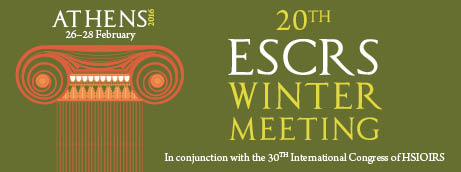Clinical outcome following cataract surgery in patients older than 90 years of age
(results will display both Free Papers & Poster)
Session Details
Session Title: Cataract I
Session Date/Time: Friday 26/02/2016 | 10:30-12:30
Paper Time: 11:06
Venue: MC3 Room
First Author: : S.Theodoropoulou UK
Co Author(s): : J. Sparrow D. Tole
Abstract Details
Purpose:
The risk for complications associated with many surgical procedures is positively correlated with age, but surgical outcomes are negatively correlated with age. The number of very elderly patients waiting for cataract surgery is predicted to increase. At the present time, however, only a few cases of cataract surgery have been reported in patients older than 90 years of age in UK and throughout the world.1,2,3
The aim of our study was to determine the clinical outcome following cataract surgery in this age group of patients older than 90 years of age.
References
1.SyamPP,EleftheriadisH,CasswellAG,et al.Eye.2004;18:59-62.
2.RobbieSJ,MuhtasebM,QureshiK,etal.BrJOphthalmol.2006;90:1516-8.
3.MönestamE, WachmeisterL.AmJOphthalmol. 2004;137:145-55.
Setting:
Data were extracted on 635 operations from Bristol Eye Hospital, University Hospitals Bristol NHS Foundation Trust using an electronic patient record (EPR) system between January 2012 and December 2014.
Methods:
Anonymised data on 635 eyes from 589 patients older than 90 years of age undergoing cataract surgery over a 3-year period were collected.
Outcome measures included intraoperative and postoperative complication rates, and preoperative and postoperative visual acuities. Ocular co-morbidities were assessed as risk indicators for visual outcome.
Results:
Ocular co-pathology was present in 36.9% patients over 90 years of age undergoing cataract surgery. Preoperative visual acuity was 0.30logMAR or better in 26.5% eyes. Postoperative best-corrected visual acuity(BCVA) was 0.00 and 0.30 logMAR or better in 10.3 and 73.0% eyes. For eyes without ocular co-pathology, postoperative BCVA was 0.00 and 0.30 logMAR or better in 11.3 and 75.1% eyes, whereas in eyes with co-pathology BCVA was 6.2 and 48.7% respectively. Percentage of eyes with a predictive postoperative refraction of ±0.5D and ±1D was 55.8 and 83.7% respectively. Posterior capsule rupture or vitreous loss or both occurred in 4% cases.
Conclusions:
Poorer cataract surgery outcome results were noted in patients older than 90 years, more in patients with ocular co-morbidity. Factors that need to be taken into consideration prior to performing cataract surgery in older patients include ocular co-pathology and the likelihood of intraoperative complication. However, surgeons should not be deterred from offering cataract surgery to the very elderly as successful visual rehabilitation occurs.
Financial Disclosure:
NONE


